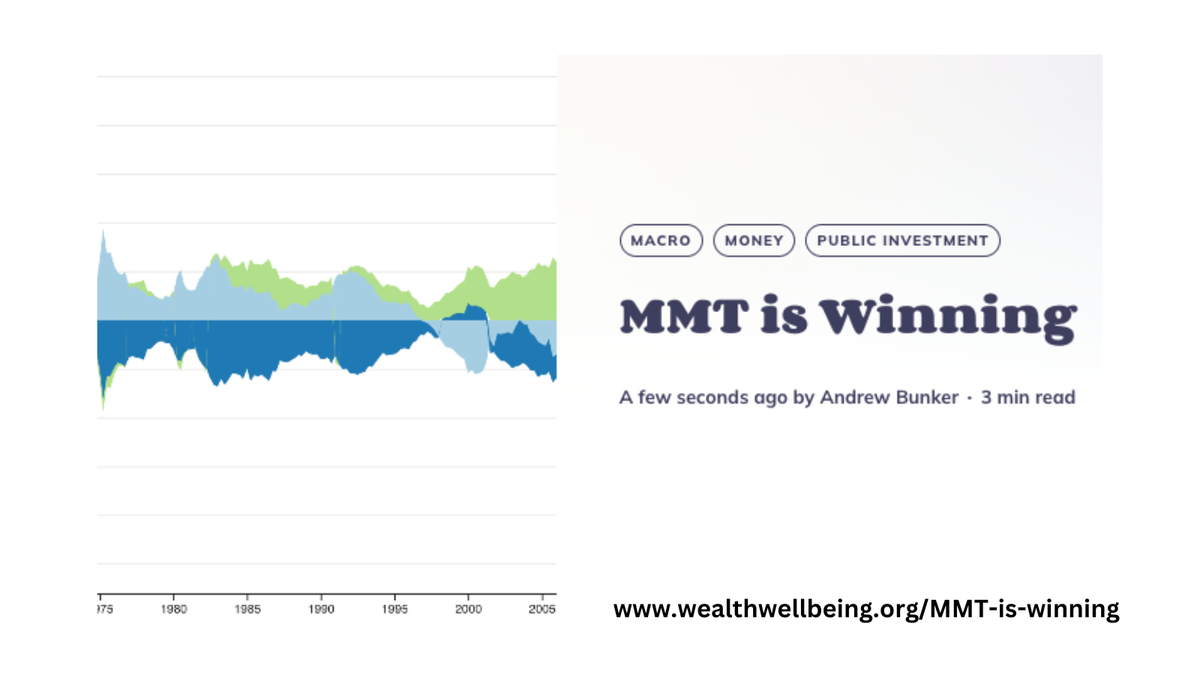Are high interest rates inflationary?
If you've heard of MMT, (Modern Money Theory a.k.a. Modern Monetary Theory) chances are you've also heard of Warren Mosler, a hedge fund manager who made it his business to understand monetary operations – the reality of how central banks operate– to accurately inform his investment strategies.
Warren treated us to an insightful conversation on how the Fed has it completely backwards on inflation and interest rates, and what the Fed can do to reduce the deficit & fight inflation at the same time.
Warren breaks it down so anyone can join the conversation.
Stay Ahead of the Curve
Full Transcript
Have you ever considered trading again?
Warren: What's been very good, for two or three years now, is my son got interested. And so I started talking to him every day now about, you know, financial markets and how they work and he started watching and observing. So it was two and a half years ago where I said, 'look, everything I told you about in the past, you can believe it or not, but it's happening again.'
Warren: The Fed has it backwards, completely backwards. They're raising interest rates because that's supposed to slow the economy down, cause unemployment to go higher. All the progressive economists were furious at the Fed for beginning a policy to go from 0% - 5.5% with the express purpose of having unemployment go up to 4.5 - 5% to bring the inflation down. And it was under intense criticism. And I was saying: you've got it backwards.
What they missed is that the public debt has gone from 35% of GDP held by the public to about 100%. So these increases in rates, which mean the government has to pay more interest on the public debt, because — what happens when they raise rates— the only thing that actually happens operationally at the Federal Reserve is they pay more interest on the public debt. The Treasury pays more and the Fed pays more on reserves and RRP. And that went from $400 billion on the way to $0 to $1.2 trillion on the way to $1.7 trillion.
And it's obscenely regressive. I was telling him it only goes to people who already have money in proportion to how much they already have. This is trickle down that would make Reagan blush. This is like the worst case of trickle down, regressive economics you'll ever see in your life.
The Fed has done this unilaterally. Congress approves, both houses, they think it's the right thing to do— the right way to fight inflation is to pay $1.7 trillion dollars a year in stimulus money, you know, basic income, but only to people who already have money, in proportion to how much they have. 'That'll bring inflation down for sure! That'll cause unemployment to go higher.'
I say, this is madness! It's going to cause the economy to grow, not shrink. The Fed forecast, all the private forecasts were for negative growth in six months because of the you know, extreme rate hikes, the financial system collapsing. So it's not going to happen it's the other way. You're flooding them with money. Okay, and we're going to have a, you know, we have a big spike in the price of oil that caused prices to go up. It then came down. So prices come down, but not as far because underneath it all we've got 6 - 7% deficit spending— more than half of it for interest— with 3.8 - 3.9% unemployment. This is like nuts! This is insane levels of deficit spending. Normally at this point in the cycle, 2006 and '07, when we had low unemployment, uh, we would have 1% government deficit. You know, 2000, we had a government surplus of a percentage — it was counter cyclical, it was creating drag to kind of slow things down. It was never a pro-cyclical, you know, 6% deficit. After the crash, when unemployment compensation goes up and, you know, tax receipts collapse, then the deficit goes up to 6%. Not, not proactively in front of this stuff, but we had all those, infrastructure programs and everything else, which would have been a 2% deficit, which was still decent.
And on top of that, we had another 4% plus for interest expense. So now we're just— you know, I don't even know how to say it. If they had a meter that registers levels of government spending, deficit spending, we're at the drunken sailor level that they all talked about. And he's been able to watch over the last two years that every forecast is wrong, every forecast kept getting pushed out. Every pushed out forecast was wrong. Everything kept getting revised up. We saw record-low unemployment under 4% for two years, it's never happened before. 3% growth, which is boom time, and after coming down, inflation is now gravitating up towards the Fed Funds Rate, which you know, I told him it would do because it always says, because the interest rate is kind of like a stock split or stock dividend, you take the basic net financial assets.
You just pay out, give everybody 5.5% more for doing nothing. You just diluted it. Okay. And it's, it's active. It's out there and it's income for somebody. And it doesn't, it's not something you trade off of on a day to day basis, but over time it creates this. Um, you know, uh, let's call it an inflationary bias— imparts an inflationary bias to the whole system. It always has. I've seen this for 50 years. The interest rate kind of is the inflation rate and you don't have enough time for me to make the whole case, but. And go through the, you know, the details, but it sort of is. And so, um, thats— and he's seeing that happen. So, even though I've been, I haven't been active in the financial markets at all, and where people say, Oh, you know, well, that was a lot easier than, than it is now. And I've been saying, no, you just have to be, you know, it's just, it's still there.
It's just whether you can see it or not. And that's been the easiest. Once you see that it's been created the easiest, most secure opportunities, you know, all the times I was engaged in the market. And they were all, there were a lot of them before, but this one's, it's no different than what's been happening the whole 50 years I've been in it.
That's why I started off by saying it, it hasn't changed. The same people are there who don't see these things. And, and... Here we are.
What would a good interest rate be?
Warren: I wrote a paper in the end of the 1990s, '96-'97, you know, permanent zero rate policy. Just put it to zero and leave it there. The burden of proof is on anybody who wants it to be higher. You have to give me a reason why it shouldn't be at zero And nobody's yet come up with a reason why it should not be at zero, except people who have it backwards, like the Fed, they're trying to fight inflation, but they're making it worse.
So if you know, it makes it worse. Why would you do it? Well, you wouldn't. This— I haven't come across a legitimate reason to keep rates higher than zero or even lower than zero, just leave them there. Which Japan did for 30 years, roughly, right. And we did for 10 years and Europe, Europe did for 10 years or so. And there's never any inflation or anything like that.
Those were— that was just fear mongering.
In order for the Fed to let go of the Phillips curve and interest rate policy as a way to fight— or to stabilize prices, what's the new mode of operation that could actually supplant that?
Warren: Look, if they just cut rates, if they cut rates to 0% tomorrow, they'll be cutting government spending over the next 10 years, probably like $20 trillion dollars.
Do you know how much agony they have to go through to cut it, you know, $200? This is $20 trillion. Like, just by cutting rates to zero. And who's, who is going to lose? All the people that already have money, that are getting money on top of that? Why, what's, why are we subsidizing those people anyway? What kind of a policy is that to give basic income only to people who already have money, in proportion to how much they already have?
What kind of government would ever do that if they understood what they were doing? It's all going to be some kind of mistake, right? A misunderstanding. I don't think anybody would deliberately do that. I don't think secretly they've been saying, 'Look, why don't we hand out $20 trillion to people who already have money and we'll call it inflation fighting!'
I don't think there's like some conspiracy. It's just too far out there. This has got to be ignorance, you know, on a yet unimagined scale. And if you look at Jared Bernstein, that's how they are! And that's what you, you know, that's what I've unfortunately come to expect from them. Not that I expect it. It doesn't surprise me that they're like that and that they make these, you know, horrendous, you know, costly blunders that destroy hundreds of millions of lives globally, continuously.
What is a good way to make sure that prices are affordable for key provisions?
Warren: The effective way is number one, go to a zero rate policy. So remove a lot of the price pressures, at least from here, you're not going to roll prices back, but you're going to stabilize things more than anybody can imagine.
Curious to read more?
Check out Stephanie Kelton's post on the topic (from February 2023) & Warren Mosler's books: Soft Currency Economics and The Seven Deadly Innocent Frauds of Economic Policy.
And yes, Warren is sporting a MT900 shirt!
feedback | consulting | media | philanthropy
Brought to you by our sponsor



